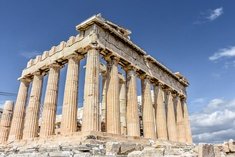Featured Quizzes
User Quizzes
Create Quiz
Data and Charts
Badges and Games
About JetPunk
JetPunk Shop
Dark Mode

Ancient Greece
A quiz about words and phrases in the context of ancient Greece
Level: not very easy but I think it's possible;)
Just don't get intimidated by the amount of text
Rate:
Last updated: January 25, 2020
You have not attempted this quiz yet.
More quiz info >>
| First submitted | September 24, 2018 |
| Times taken | 27 |
| Average score | 30.8% | Report this quiz | Report |
12:00
Enter answer here
0
/ 26 guessed
Time Used
00:00
Best Time
00:00
The quiz is paused. You have remaining.
Scoring
You scored / = %
This beats or equals
% of test takers
also scored 100%
The average score is
Your high score is
Your fastest time is
Keep scrolling down for answers and more stats ...
|
|
Gassu
+1
Level 70
Sep 24, 2018
100%
New and Popular
Save Your Progress
Copyright H Brothers Inc, 2008–2024
Contact Us | Go To Top | View Mobile Site
